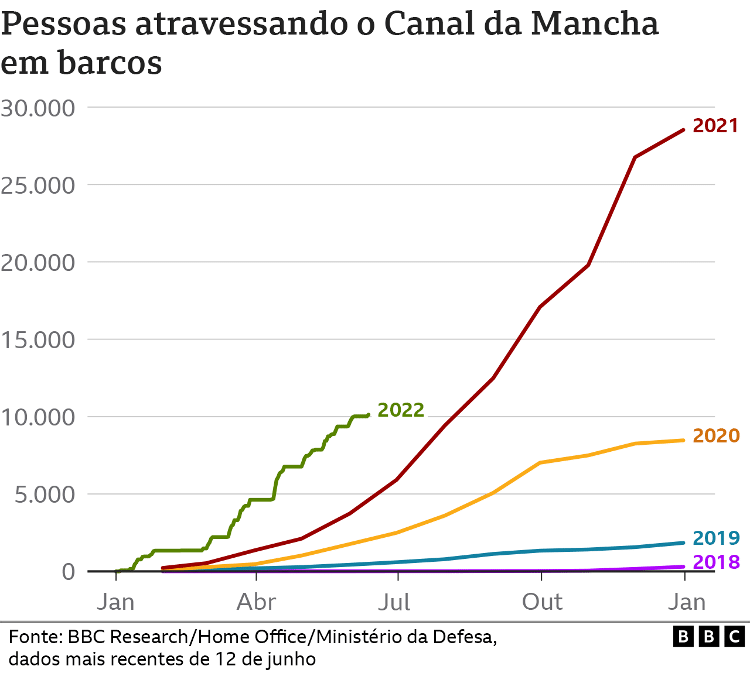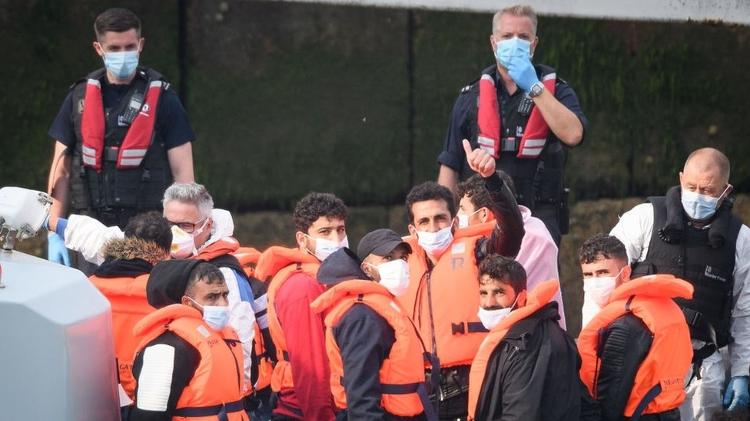According to the British government’s plans, some asylum seekers crossing the sea between France and England will be sent to Rwanda, a country in east-central Africa.
The rationale was that the program contested in court deterred others from crossing the English Channel.
However, there are concerns about human rights and whether Rwanda will be the right place for asylum seekers.
What is Rwanda’s asylum plan?
The scheme, which is experimental and is expected to take five years, requires that some refugees arriving in the UK be sent to Rwanda to apply for asylum in that African country.
The first refugees are expected to be dispatched this Tuesday (14/06).
The plan is believed to primarily target young single migrants who arrive by the UK government “through illegal, dangerous or unnecessary means”, such as hiding in small boats or trucks.
Where do asylum seekers in the UK come from?
Until recently, the majority of asylum seekers crossing the English Channel came from Iran – 80% in 2018 and 66% in 2019.
But now there is a greater mix of nationalities. Iranians accounted for 30% of small boat arrivals last year. Approximately 21% were Iraqi, 11% Eritrean and 9% Syrian. About 75% were men aged 18 to 39 years.
It is known that 28,526 people crossed the English Channel in small boats in 2021, compared to 8,404 in 2020. This year’s total is likely to be much higher.
How many people are sent to Rwanda?
British Prime Minister Boris Johnson has said that since January 1, those who have entered the UK illegally can be sent to Rwanda without any number limit.
But an Home Office source told the BBC that the court’s objections to modern slavery and human rights had drastically reduced the number of refugees expected to board Tuesday – 37 initially.
According to the Care4Calais charity, 11 people are currently expected to board the plane.
What is a lawsuit?
NGOs are opposing the program in court, saying that asylum seekers do not have enough time to appeal their right to stay in the UK.
Other groups questioned whether Rwanda is a safe country for asylum seekers and argued that the policy violates human rights laws.
The British Court of Appeal rejected Tuesday’s attempt to suspend the flight.
NGO Asylum Aid filed an injunction action against the flight.
A United Nations (UN) lawyer told the Supreme Court in London that refugees would be at risk of “serious and irreparable harm” if they were sent to Rwanda.
But Johnson said the administration knew “very active lawyers” would try to challenge policy.
In his view, activists “wanted to have a completely open approach to immigration” and it was important to “stop criminal gangs” that were sending people across the Channel in dangerous ships.
Critics of the plan include Anglican Church leader Justin Welby, who said “Principle must and cannot be based on God’s judgment.”
According to reports in the British press, Prince Charles described the attempt as “terrible”.
How much will it cost?
The UK is investing £120m (£143m) in “Rwanda’s economic development and growth” as part of the deal.
The Home Office said the UK’s asylum program currently costs £1.5bn (£9.3bn) a year, with £4.7m (£29.1m) per day being spent on hotels to house homeless migrants.
Comparisons were made with Australia’s refugee transfer system, which is estimated to cost US$957 million in 2021-2022.
The cost of removing people from the UK per charter flight was more than £13,000 per person in 2020.
How does Rwanda welcome refugees?
Rwanda is adapting hostels near the capital, Kigali, to accommodate immigrants from the UK. Journalists visiting the facilities say the facilities are simple.
The country currently hosts around 150,000 refugees, most of them from neighboring Burundi and the Democratic Republic of the Congo.
The UN and European Union also established a “reception centre” in Gahora, 90 km from the capital, Kigali, to receive 300 refugees from other parts of the Middle East and Africa.
They tried to cross the Mediterranean from Libya to Europe, but were caught in the middle of the Libyan civil war.
How is life in Rwanda?
Some refugees in Rwanda managed to find jobs as farmers and domestic servants. However, most are unemployed and rely on state aid of around £35 a month.
The Rwandan government says the country has seen “miraculous” economic growth since 1994, when a genocidal war killed 800,000 people.
The number of people living below the national poverty line fell from 77% in 2001 to 55% in 2017. Life expectancy at birth increased from 29 in the mid-1990s to 69 years in 2019.
However, Rwanda remains one of the poorest countries in the world, ranking 165th in average per capita income. About 70% of the country’s 13 million population live on only basic needs, such as subsistence agriculture (when the farmer produces food to ensure his own survival, his family and the community in which he is placed).
source: Noticias
[author_name]

